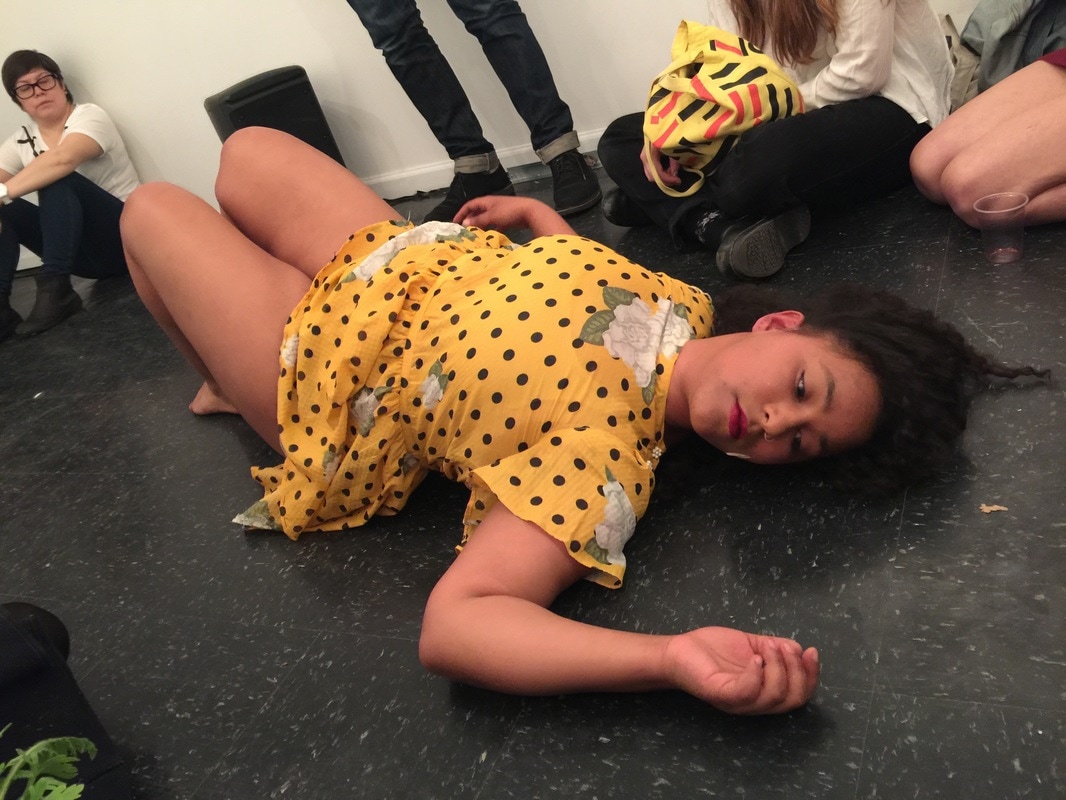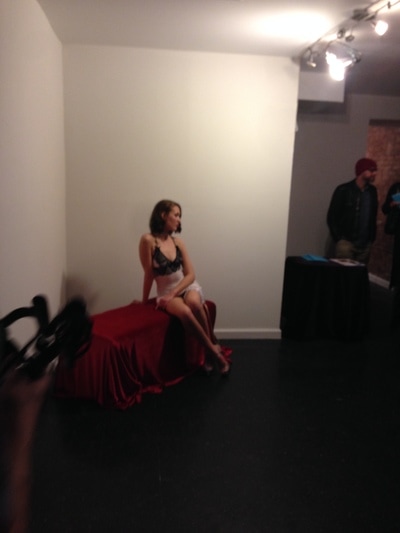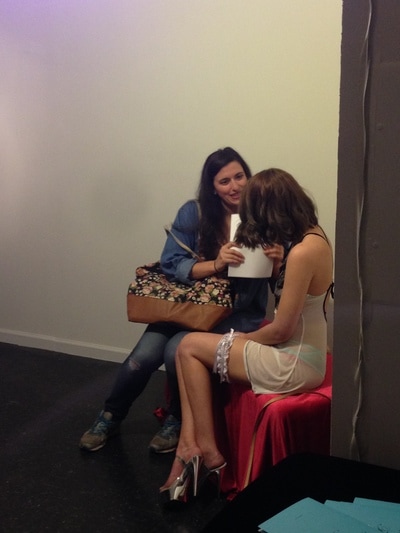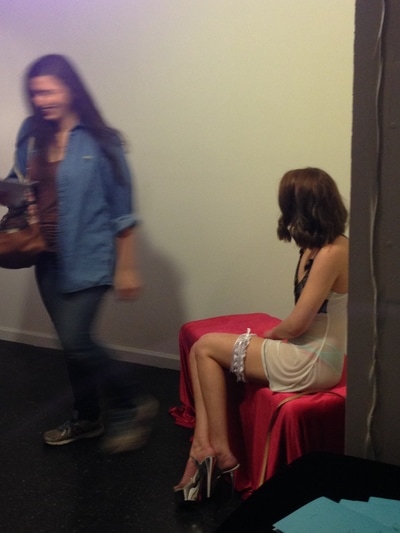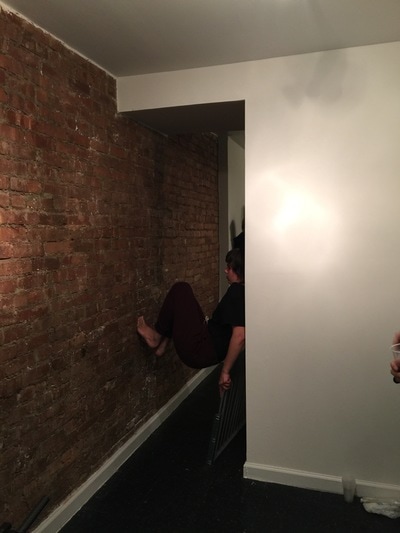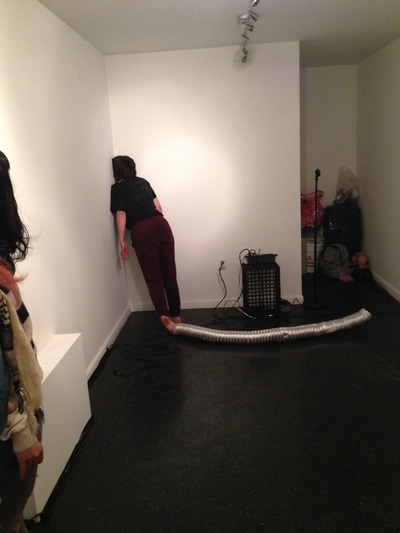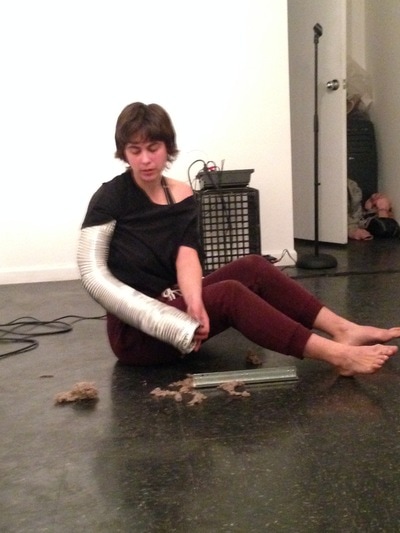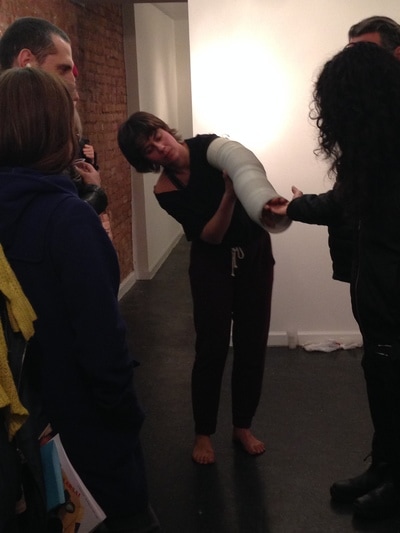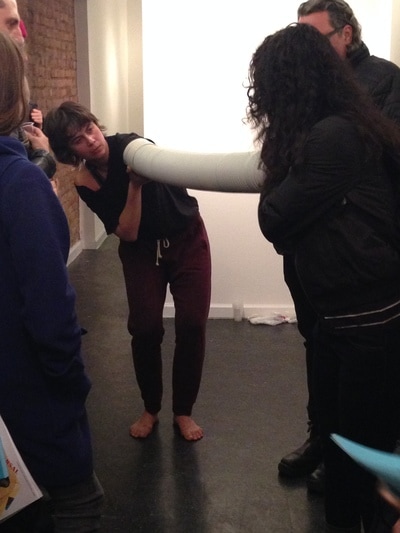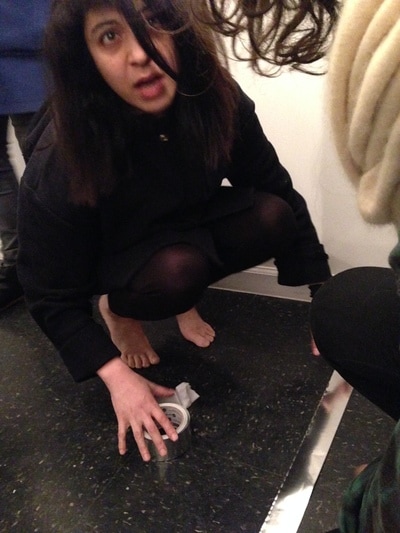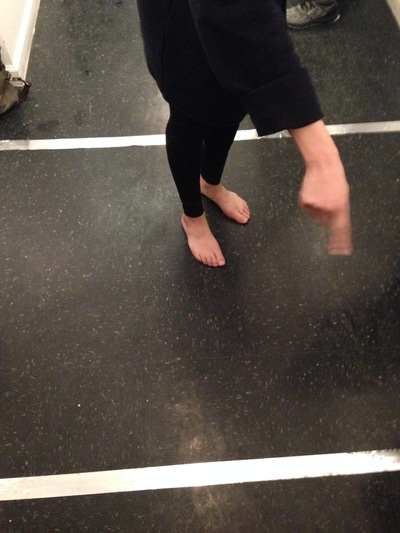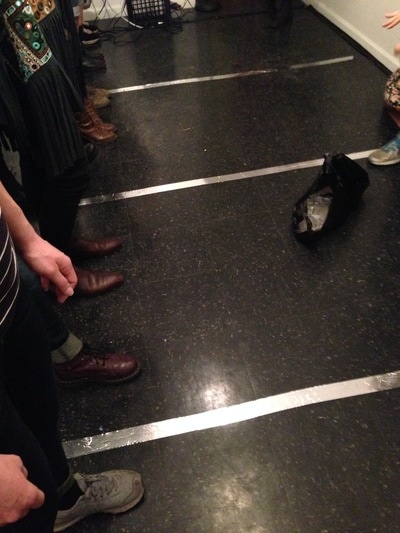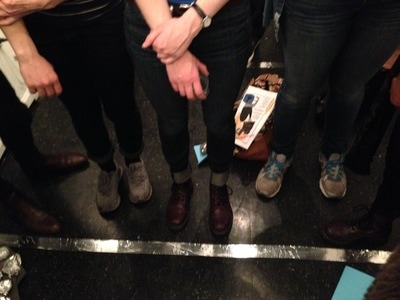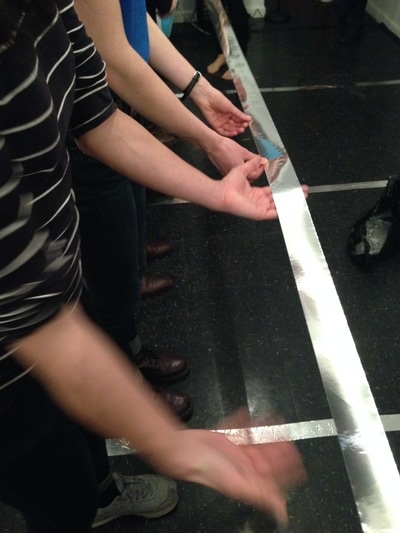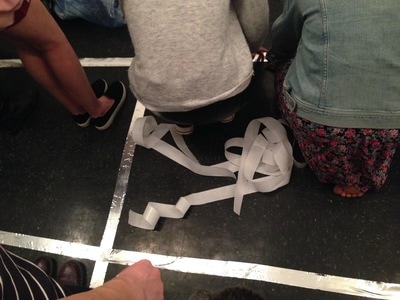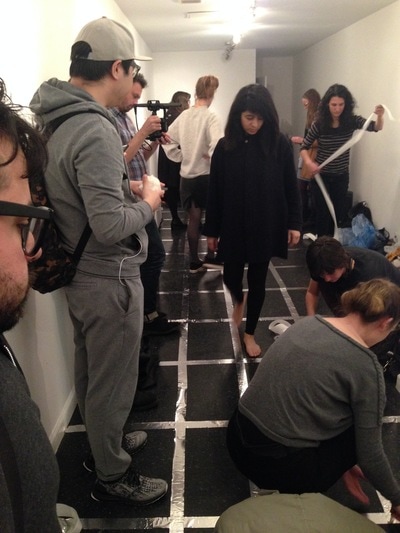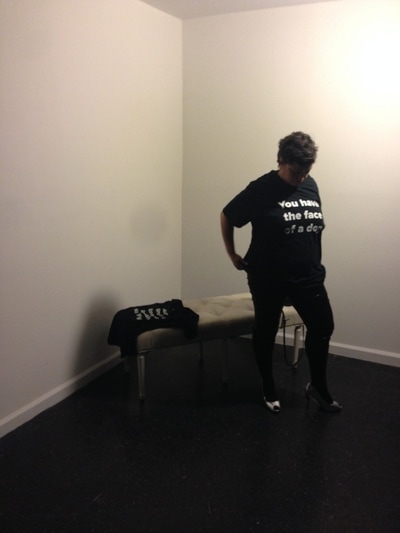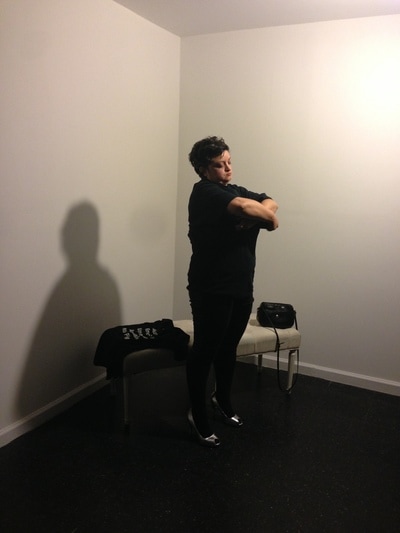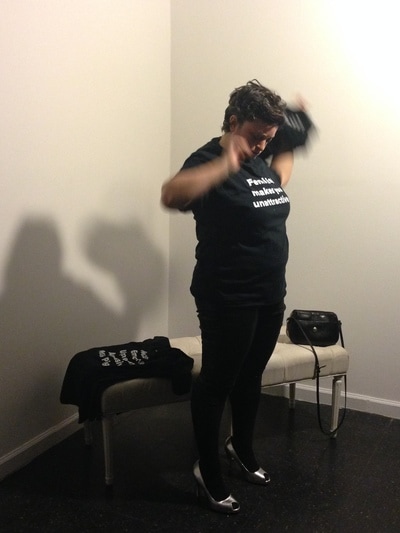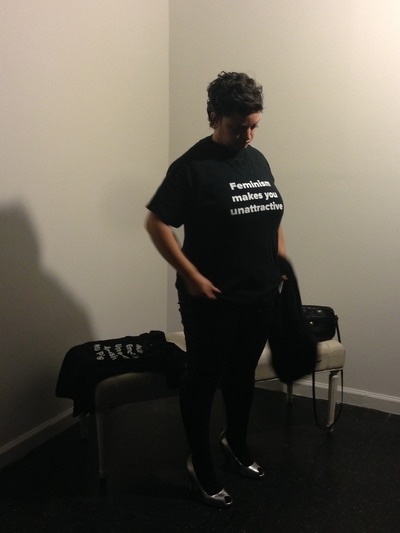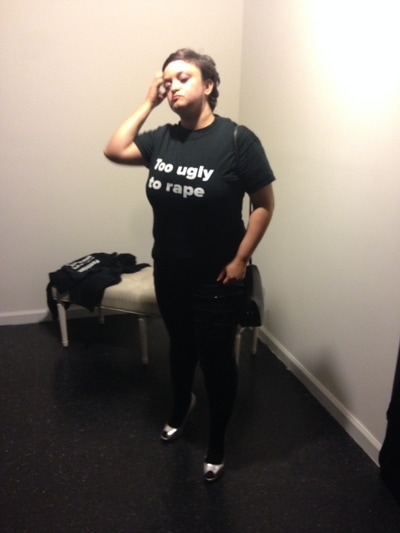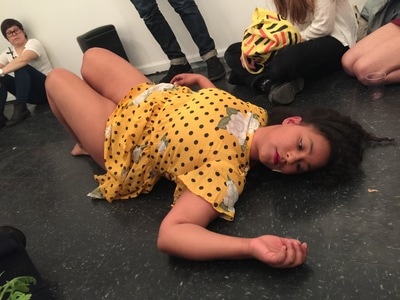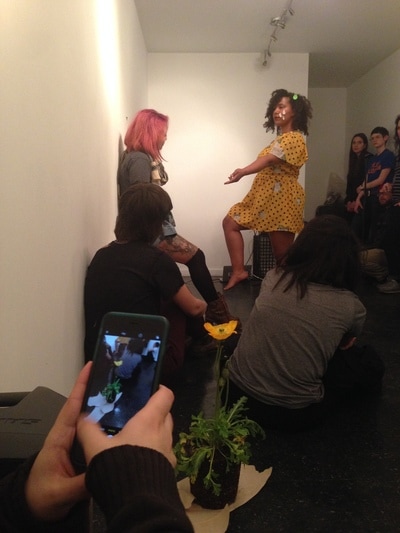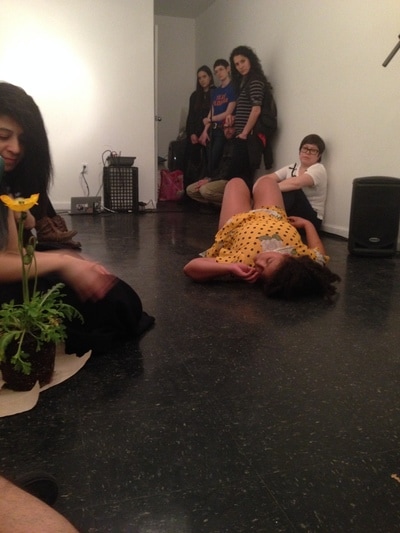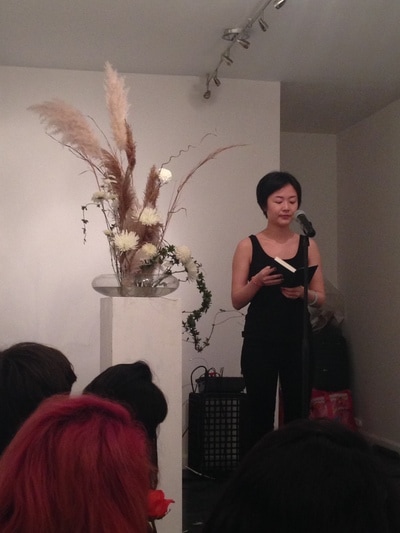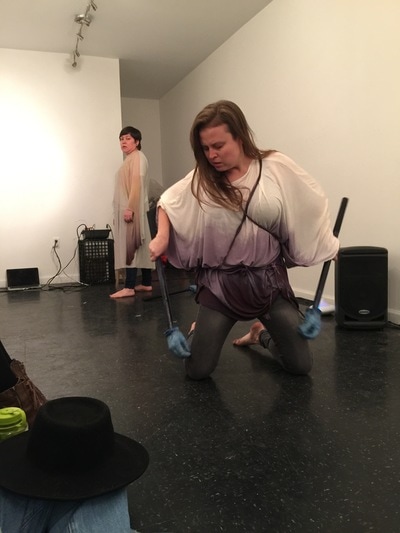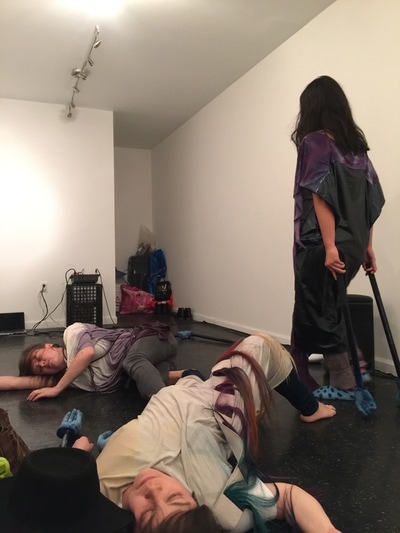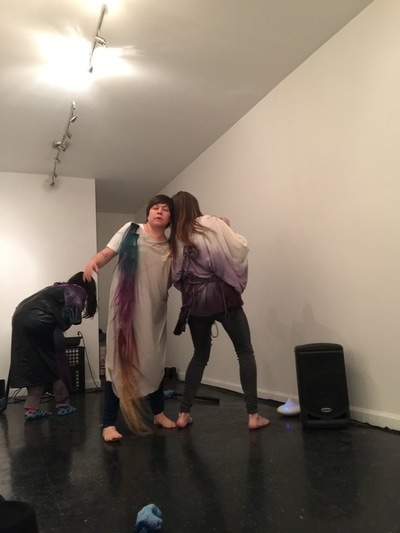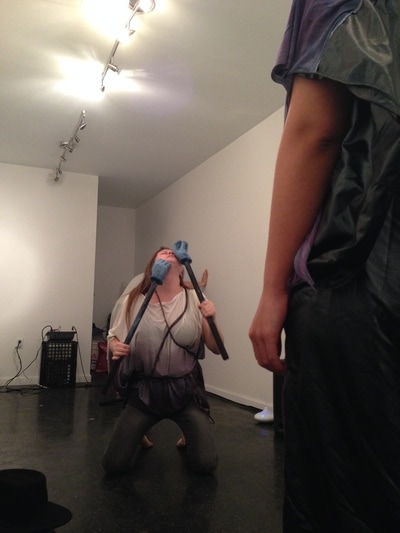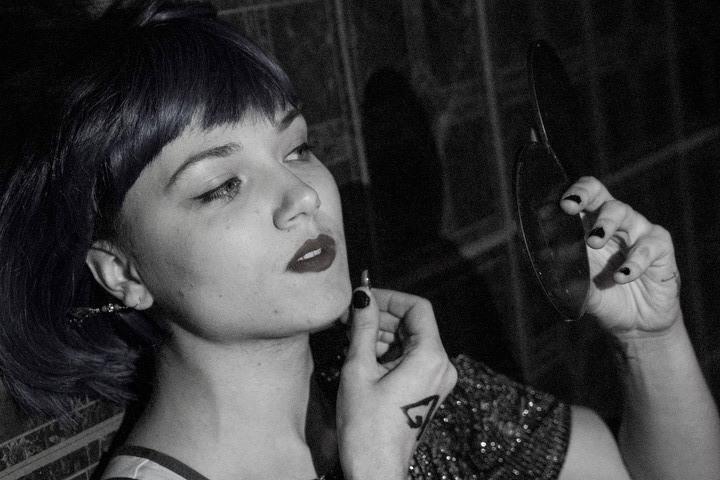|
Preparing for "Not a Rehearsal" El Museo De Los Sures, Brooklyn, NYC, April 5, 2017 By Polina Riabova On Wednesday, April 5th, I attended a movement, text, sound and action-based feminist performance event while going through what I can only refer to as a minor breakdown. Prior to leaving for Not A Rehearsal (curated by Jean Carla Rodea and Kathie Halfin) at El Museo De Los Sures (NYC) I had written a dramatic Facebook status about the TV show Girls, which somehow resulted in me missing the first performance of the evening by artist Sierra Ortega, “I scream the body electric." I was told by audience members who experienced the piece that Ortega described her problems that day (such as subway delays making her late - hi, yes, me too) then proceeded to record and loop the audio, in between takes of which she shrieked. I entered the space fuming at myself for the unprofessionalism inherent in prioritizing a Facebook status over a paid writing gig. Ironically, in not seeing Ortega’s work I made what I understood of it the essence of my reality. For the next 2 hours or so all my problems were looping inside my head and in-between them, I too, shrieked. As I waited for the second performance to begin I watched “Feminine Fix” by Monika Rostvold. Wearing a white garter and lingerie Rostvold had written instructions for the durational piece: “I am the sexy slut who listens.” Audience members were invited to sit down with the smiling Rostvold and tell her anything they wanted with the promise of a sympathetic, attractive listener. No fucking way, was my reaction even as I admired Rostvold’s examination of the double-bind of being female, young and hot. Existing as a femme body often means being prone to other people’s manipulation of your time and energy. By explicitly auctioning off her image and attention Rostvold put up a boundary between herself and the world as if to say, “I’ll give you this, but only on my terms.” Kaia Gilje delivered an impressive exploration of space as it relates to body-centric actions. Gilje began her piece in the short narrow hallway between the two rooms - suspending her body above the floor by propping herself up with her feet with a spiky metal rack posited directly below her. As she struggled not to collapse she ran her hands along the rack, playing it like an instrument. I related most to Gilje when she leaned her full weight face-first into a corner and let out strange guttural noises, then got down to clean out a silver pipe. Dust and other debris fell out as Gilje stuck her hand further and further in. She ended the piece by taking the metal rack through the hallway into the adjoining room (where Rostvold was in performance), waiting as audience members followed her one-by-one, then simply walking back into the room she had just emptied. After Gilje’s performance I stood fuming at the floor as an acquaintance I neglected to greet stared from across the room until I solemnly stared back, then at the floor again, then at Rostvold as she nodded along to someone’s story. I considered approaching her then, and though the idea of sharing an intimate truth with a stranger who had explicitly instructed me to do just that felt seriously thrilling and maybe, like it could help, I felt too engulfed by the terrorizing ring of fire that was my mood to risk loose embers escaping. While my emotional state felt immediately apocalyptic Rostvold’s work did give me pause to wonder at the other people in the room - one way or another all worlds contain their dramas. What did the person next to me consider sharing? Would I have found it surprising? Raki Malhotra’s objective was to create a perfect grid. In the dark she randomly arranged the audience into rows, shifting the natural hierarchy of how we had placed ourselves throughout the room; a girl in front of me turned to smile at her friend. As the lights flipped back on Malhotra handed out silver floor tape and began instructing us where and how to place it. Malhotra later told me she set out to impose labor and work on the audience to bring out collaboration, which is the focal point of her practice. “Would anyone else like to do it?” she asked after stating that a crooked tape needed readjustment. “Oh, so it’s me who has to do it,” was her retort as the room met her request with silence and confusion. As Malhotra’s piece unfolded Katya Grokhovsky began her two-hour durational, “One Fine Day” in the adjoining space. The premise was simple: she wore t-shirts with direct quotes from Trump’s administration regarding women, taking off one insult just to reveal the next. “You have the face of a dog” would replace “Feminism makes you unattractive” would replace “Too ugly to rape,” like a snake growing a new head each time it’s been defeated, the audience a passive witness to the transition as it occurred. I may have cried standing next to strangers in the dark, but the participatory element of Malhotra’s work eased me out of my mood swing and I found myself caring more about whether or not the rectangle I was in charge of was as perfect as it could be. Seeing the completed grid and an audience scattered throughout felt like a physical manifestation of the inside-out dynamics of performance art, elevated by Malhotras’s posed question near the end. “Does anyone feel obligated to do it cause it’s a performance?” And then, “If you feel obligated, I think it’s time to leave the performance.” The sudden comedown of my manic anger, either helped along or softened by Malhotra’s piece, made me much more pliable to the contemplative nature of “Icl grl” by Anastasia Eckerson. Wearing a warm yellow polka-dotted dress Eckerson placed a single yellow flower out of it’s pot. A recorded voice spoke of anxiety as Eckerson held repetitive motions with their body, slowly coming closer and closer to the flower until lying parallel to the exposed plant. Eckerson ended the piece by gently peeling off self-made paper teardrops they adorned throughout the performance and placing them above their line of vision. Pik-Shuen Fung’s reading of “Golden Grass, Honeysuckle, White Chrysanthemum” focused on the history of female pain and sex as shown by the maternity wards of China, along with the joy that can be found even within financial struggle and destabilizing trauma. Following the reading Julia Santoli, Jean Carla Rodea and Kathie Halfin performed the last performance of the evening, “What moves as a body returns as a movement of thought.” The central objects were the sculpted blue fists the women held on long sticks, with which they beat their stomachs, tested walls and leaned on for support. They seemed to use their bodies and later, the bodies of the audience as vulnerable instruments upon which the hands could lay their claim. It felt heavy, menacing and stoic. There were several moments during the evening in which whatever I was feeling seemed to overwhelm me and I had to force myself not to bolt out of the venue and chuck my assignment. There were moments when watching an artist I thought, but how am I going to write about this? I could only focus on the roaring in my head and everything else was a blur, a flimsy platform that would buckle under any real weight. But with live performance the memory of the image and the intent of the artist within them always remain. That I am able to not only write about Not A Rehearsal but infer meaning from the art presented is a testament to the strength of the performers. NOT A REHEARSAL PERFORMANCE DOCUMENTATION |
| ABOUT PERFORMANCE IS ALIVE CORRESPONDENT, POLINA RIABOVA // Polina Riabova is a Russian-born bilingual poet and writer and co-founder of an independent cooperative record label based in Brooklyn, Borrowed Birds Records. In her performance work she explores the intersection between public and private life and the influence it exerts on our understanding of ourselves and others as well as the complexity of interpersonal relationships and themes of vulnerability using a mix of found objects, visuals and sound. |
Leave a Reply.
CONTRIBUTORS
Ian Deleón
Quinn Dukes
Alexandra Hammond
Luke Mannarino
Polina Riabova
Sarah G. Sharp
Alex Sullivan
Archives
July 2023
August 2022
November 2021
October 2021
September 2021
May 2021
March 2021
January 2021
December 2020
November 2020
September 2020
April 2020
January 2020
December 2019
November 2019
October 2019
September 2019
August 2019
July 2019
June 2019
April 2019
March 2019
February 2019
December 2018
November 2018
October 2018
September 2018
August 2018
July 2018
June 2018
May 2018
April 2018
March 2018
February 2018
January 2018
November 2017
October 2017
September 2017
July 2017
June 2017
May 2017
April 2017
March 2017
February 2017
January 2017
November 2016
September 2016
July 2016
June 2016
May 2016
April 2016
March 2016
February 2016
January 2016
December 2015
November 2015
October 2015
September 2015
August 2015
July 2015
June 2015
May 2015
April 2015
March 2015
February 2015
January 2015
December 2014
November 2014
